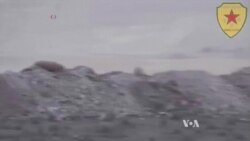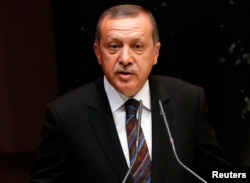Lawmakers in Iraq's Kurdistan region said on Wednesday they voted in favor of sending Kurdish forces to the besieged Syrian town of Kobani via Turkey.
Kurdistan President Masoud Barzani sent a letter to parliament late Tuesday, seeking approval to deploy the region's peshmerga forces abroad to fight alongside Syrian Kurds.
Earlier Wednesday, Turkish President Tayyip Erdogan criticized the United States for airdropping military supplies, some of which alledgedly fell into the hands of Islamic State militants rather than to the Kurdish fighters struggling with them for control of the Syrian border town of Kobani.
"What was done here on this subject turned out to be wrong. … Some of the weapons they dropped from those C130s were seized by ISIL," Erdogan said Wednesday, using a common acronym for the militant group, at a news conference in the Turkish capital Ankara.
Kobani, a predominantly Kurdish town on the border with Turkey, has been under sustained attack for weeks from better-armed Islamic State militants who have overrun vast swaths of Iraq and Syria.
Two senior Kurdish officials said late on Tuesday that preparations were under way to send a small number of peshmerga to Kobani, but that it would take several days until the necessary arrangements were in place.
Turkey announced earlier this week it would allow the peshmerga fighters from Iraq to cross into Kobani.
Investigating video claim
The U.S. Defense Department continues to investigate whether one of the 28 shipments of weapons and ammunition it dropped in the Kobani area on behalf of the Iraqi Kurds actually ended up in Islamic State hands.
A video posted by a pro-Islamic State media group showed a masked fighter inspecting hand grenades, ammunition and rocket-propelled grenades, while Syrian activists reported militants got at least one of the shipments.
U.S. Central Command had said Monday that an airstrike destroyed what it called a "stray resupply bundle," but it was not clear if those were the same weapons depicted in the video.
Also Wednesday, the Defense Department said that while the situation in Kobani remains tenuous, Kurdish forces remain in control of most of the city.
And coalition airstrikes killed around 25 Islamic State fighters near the northern Iraqi city of Baiji, residents told Reuters. The news agency, citing sources from the Iraqi army, also said some of its tanks and armored vehicles repelled an IS attack on Amiriya Fallujah, a town west of Baghdad.
The airstrikes are supporting Kurdish forces defending the Mosul Dam complex in Iraq, as well as Iraqi security forces trying to push back Islamic State militants in Anbar province.
A U.S.-led coalition conducted 12 airstrikes near the Mosul Dam complex in northern Iraq, U.S. Central Command said in a statement on Wednesday. U.S. forces also conducted six airstrikes close to Kobani near Syria's border with Turkey, it said.
The strikes in Syria destroyed a logistical center for Islamic State, a militant group that has declared a caliphate, or Muslim theocracy, and seized territory across Iraq and Syria. The strikes also destroyed one of the group's buildings, vehicles and fighting positions, Central Command said, citing assessments based on initial reports.
In Iraq, the strikes destroyed a large group of Islamic State fighters along with vehicles, fighting positions and a mortar-lauching site, according to the U.S. statement.
Situation remains fragile
Pentagon spokesman Rear Admiral John Kirby acknowledged the situation in Kobani remains fragile as Kurdish defenders continue to battle Islamic State fighters.
"Kurdish forces in the city are in control of the majority of the city. I would hesitate to put a number figure on that, but we do believe that they are in possession of a majority of it," Kirby said.
"That said, ISIL forces continue to threaten it. As you may have seen, overnight we took more airstrikes," Kirby said. "We’re continuing to hit targets in and around there to help Kurdish forces as they continue to fight against ISIL. So, it’s still a very mixed, contested environment."
The Pentagon spokesman repeated the view that Kobani could still fall.
Kirby said the militants remain inside the city in some strength, but added they have not made progress in days.
Kurdish fighters, backed by coalition airstrikes, have slowed the Islamic State advance, he said.
Success in Kobani matters because the city is important to IS militants, Kirby said. "They are flowing resources [in] and, therefore, presenting targets that it would be foolish for us not, given the capabilities we have, to hit, because the overarching goal here, it’s about degrading and destroying their capability."
"So, every time we hit them and we kill some of their fighters, or we knock out some of their firing positions, or we hit a vehicle, we’re helping to degrade their capabilities. It’s not like these guys have a whole troop of auto mechanics that they’ve trained to keep this stuff going. So, their ability to sustain themselves is limited," he added.
Airstrikes in Iraq
Meanwhile, in Iraq – considered the main theater for the coalition air campaign called Operation Inherent Resolve – coalition airstrikes seek to support Iraqi Kurds.
Kirby insisted the United States and its allies have not "turned their backs on Anbar."
"There have been real challenges in terms of what we can do there largely because of the weather, but also because of some of the defensive mechanisms that ISIL has thrown up in the way," he said. "So, things are starting to move and I think you're going to continue to see that momentum there inside Iraq."
Kirby said Iraqi security forces present a mixed picture in terms of competence and capabilities, calling it an army that was not properly resourced, trained or maintained for three years.
The Pentagon spokesman said that security forces are being advised by 12 U.S. teams – seven in and around Baghdad and five in Irbil in northern Iraq – and that more are on the way.
Fully a third of Iraqi forces are operating in Anbar and are on the move to relieve forces defending Baiji, north of Baghdad, Kirby said.
There are currently about 1,400 U.S. military and diplomatic security personnel in Iraq, but no specific requests for more advisers have been made.
Meanwhile, Kirby said Operation Inherent Resolve, begun August 8, has cost the United States about $424 million.
VOA's Victor Beattie contributed to this report. Some material for this report also came from Reuters.







